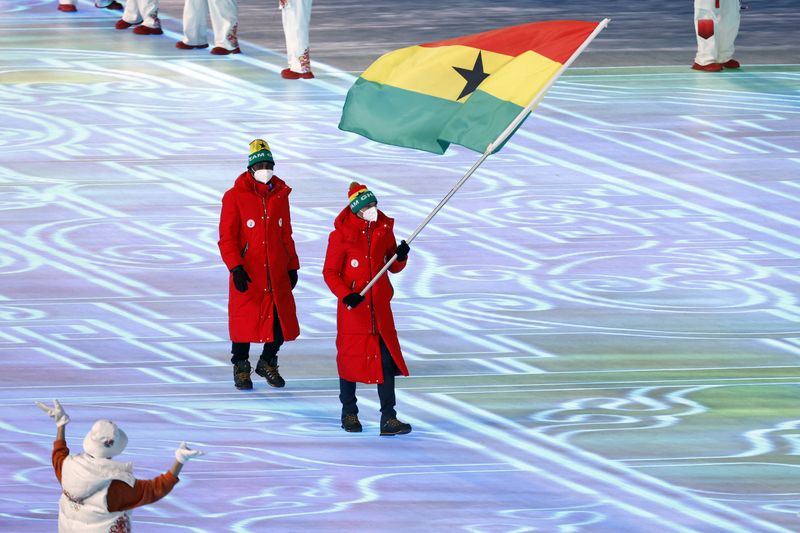YANQING, China (Reuters) – In a sport dominated by Europeans and North Americans, the Olympic Alpine giant slalom has a way of attracting competitors known on the ski circuit as “the exotics”, from countries with little or no winter sports tradition.
Violinist Vanessa-Mae was one well-known example, competing for Thailand at the 2014 Sochi Games where she finished 67th.
This year, skiers representing Saudi Arabia, Cyprus, Timor Leste, India, Mexico, Jamaica, Ghana, Puerto Rico, Eritrea, Madagascar and Israel all signed up for the Olympic giant slalom.
While some openly admitted their aim was to widen diversity or to simply soak up the atmosphere of the Olympics, others had come because they wanted to compete.
“It was clear that I go for gas rather than being safe. I always want to go as fast as possible. For me, just coming down, that’s not an option; that’s not my DNA,” said Ghana’s 43-year-old Carlos Maeder, one of 33 skiers who failed to finish the first leg of Sunday’s men’s giant slalom.
Maeder, who was adopted by a couple in Switzerland and said he could ski before he could walk, embraces the term “exotics”. “Ghana doesn’t stop at the borders,” he added.
Scholarships and personal wealth can help with paying for the training and travel needed to qualify for the Olympics. Some racers put the cost of preparing for the Games at around $70,000.
“I’m still a one-man show. I’ve never had like a federation in the back or like a personal coach so it was a lot of work,” Maeder said.
Fayik Abdi, Saudi Arabia’s first Winter Olympian, learned to ski at the age of four on holidays in Lebanon, but started racing less than a year ago. He said he was indifferent about being labelled one of the “exotics”.
“It is odd but it is also accurate to what we are to the sport,” said Abdi, who came 44th of the 46th finishers. “We need to start breeding kids and the next generation from a super young age.”
Abdi, who has lived in Saudi Arabia, the United States and Europe, said that even if he had not finished but had skied his best, that would been satisfying enough.
“The more diverse the sport or any sport can be, the better. This is the beginning not just for Saudi Arabia but for many nations and hopefully in the future we’ll see more countries and teams contending,” Abdi said.
Thailand’s Nicola Zanon, who finished in 38th place, 29.01 seconds after giant slalom winner Marco Odermatt of Switzerland, acknowledged there was still a lot of work to do for nations like his to rise in the rankings, but that finishing was an important signal.
“I did a safe run because my federation wants to complete the race, that’s our goal,” he said.
Mexico’s Rodolfo Dickson Sommers, who finished 35th, said a lot of the “exotics” — a term he felt correctly identified them as unique in the sport — could technically go faster than they often did in races.
“It’s nice going through the finish,” he laughed.
On the other side of the fence, giant slalom gold medallist Odermatt had a message of encouragement for his competitors from more tropical climes.
“It’s probably not so easy if you don’t have snow around but in the end, if you have a dream, you just have to work for it, try everything and take what you get and try your best in each situation,” Odermatt said.
(Reporting by Shadia Nasralla; editing by Clare Fallon)



















